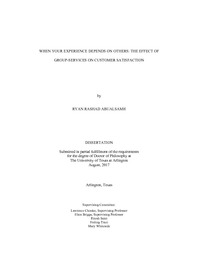
ATTENTION: The works hosted here are being migrated to a new repository that will consolidate resources, improve discoverability, and better show UTA's research impact on the global community. We will update authors as the migration progresses. Please see MavMatrix for more information.
Show simple item record
| dc.contributor.advisor | Lawrence, Chonko | |
| dc.contributor.advisor | Briggs, Elten D. | |
| dc.creator | Abualsamh, Ryan Rashad | |
| dc.date.accessioned | 2018-03-08T19:16:42Z | |
| dc.date.available | 2018-03-08T19:16:42Z | |
| dc.date.created | 2017-08 | |
| dc.date.issued | 2017-11-01 | |
| dc.date.submitted | August 2017 | |
| dc.identifier.uri | http://hdl.handle.net/10106/27267 | |
| dc.description.abstract | Previous research on customer-to-customer interactions studied the interactions between customers who are present in the same service environment. The interactions in these studies are not planned; they occur by chance, or sometimes are even encouraged to occur, but never planned as part of the core-service. In this dissertation, we expand the body of literature in this domain to include planned customer-to-customer interactions in services that are called group-services. A group-service is designed to serve more than one customer participating in the same service, at the same time, and depending on customer interaction and collaboration with one another. This topic is widely neglected, yet very critical to the service experience. Customer interactions under these circumstances, place the company at higher risk of customer dissatisfaction. Customers in group-services are not only co-creating a service with the service provider, but they are co-creating the service jointly with other customers, that are strangers to them.
In this dissertation, we examine the effects of a group member’s positive or negative behaviors on a customer’s satisfaction with the company and with the employee. We conduct three studies including a pilot study. Results indicate group member’s behavior affecting satisfaction with the company as well as with the employee. We also look at some boundary effects to this relationship including, consumption type, service outcome and group formation. Drawing from attribution theory, we find that customers attribute different aspects of the service to the company and employee. We reexamine the Service Marketing Triangle model, to include interactions with other customers. Furthermore, we develop a classification scheme for services that involve groups of customers. The classification highlights the different service situations from the perspective of customer-to-customer interactions. Finally, the dissertation concludes with a discussion of the managerial relevance of the service experience by drawing from compatibility management literature. Some suggestions for practitioners to manage customer compatibility and enhance customer satisfaction are proposed, as well as some suggestions for future research. | |
| dc.format.mimetype | application/pdf | |
| dc.language.iso | en_US | |
| dc.subject | Group-services | |
| dc.subject | Customer experience | |
| dc.subject | Customer-to-customer interaction | |
| dc.title | WHEN YOUR EXPERIENCE DEPENDS ON OTHERS: THE EFFECT OF GROUP-SERVICES ON CUSTOMER SATISFACTION | |
| dc.type | Thesis | |
| dc.degree.department | Marketing | |
| dc.degree.name | Doctor of Philosophy in Marketing | |
| dc.date.updated | 2018-03-08T19:16:42Z | |
| thesis.degree.department | Marketing | |
| thesis.degree.grantor | The University of Texas at Arlington | |
| thesis.degree.level | Doctoral | |
| thesis.degree.name | Doctor of Philosophy in Marketing | |
| dc.type.material | text | |
| dc.creator.orcid | 0000-0002-2566-2727 | |
Files in this item
- Name:
- ABUALSAMH-DISSERTATION-2017.pdf
- Size:
- 2.062Mb
- Format:
- PDF
This item appears in the following Collection(s)
Show simple item record


